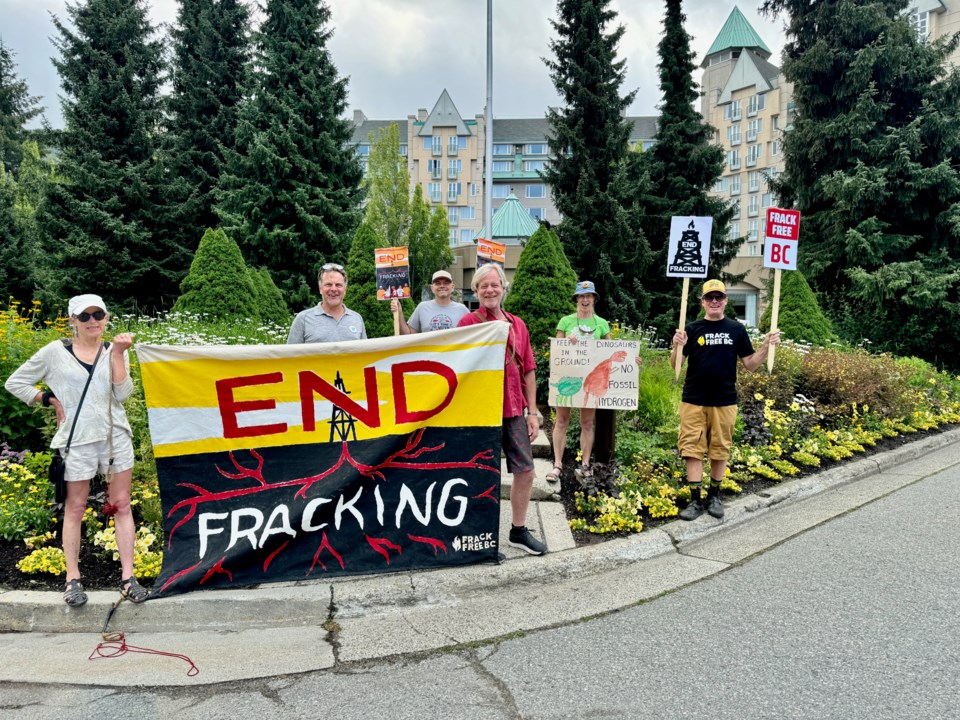Climate demonstrators were outside the Fairmont Chateau Whistler July 22 to take a stance against fracking to develop hydrogen energy.
The demonstration was held by Frack Free BC coalition and spurred by the Pacific NorthWest Economic Region summit (PNWER), which is taking place from July 21 to 25 in Whistler.
The summit brings together politicos from across the Pacific Northwest and is billed as a venue to discuss transitioning to clean energy. However, Frack Free BC took issue with oil and gas industry sponsorship and input.
Dave Heighway with Frack Free said the group was concerned discussions would centre around blue hydrogen, an energy made from natural gas, as major sponsors from the event include the Canadian Association of Petroleum Producers Company, Enbridge and Fortis BC.
“It looks as though our premier [David Eby] is putting all of B.C.’s eggs into this basket of producing hydrogen from fossil fuels, continuing fracking, which is destroying the environment,” Heighway said.
Hydrogen energy can come as green, blue or grey, and green hydrogen is considered the best type of hydrogen power because it’s made from renewable energy electricity by splitting hydrogen and oxygen from water.
Blue and grey hydrogen comes from natural gas or coal production, and grey hydrogen turns blue if the carbon emitted is sequestered. Carbon sequestering is touted by oil and gas companies as a method for reducing emissions, and is an approved method in climate agreements to reach net-zero goals.
West Vancouver-Sunshine Coast-Sea to Sky Country MP, Patrick Weiler, highlighted the clean hydrogen investment tax credit which is part of the federal government’s efforts to transition to a lower carbon future.
“The way that we passed the tax credit, it can be for green hydrogen, as well as blue hydrogen. But when we're talking about hydrogen made from natural gas, it's a much smaller tax credit. But at the end of the day, it will produce a much lower carbon form of energy than things like oil or natural gas, so there’s an opportunity there,” he said.
A 2021 study by Cornell University titled “How green is blue hydrogen?” found that “[w]hile carbon dioxide emissions are lower, fugitive methane emissions for blue hydrogen are higher than for gray hydrogen because of an increased use of natural gas to power the carbon capture. Perhaps surprisingly, the greenhouse gas footprint of blue hydrogen is more than 20% greater than burning natural gas or coal for heat and some 60% greater than burning diesel oil for heat.”
The authors went on to say carbon capture is “an optimistic and unproven assumption.”
One of the pieces up for discussion at PNWER is transitioning freight trucks to hydrogen, and Weiler highlighted Squamish-based Quantum Technology as a piece of the low-carbon puzzle.
“They actually have an MOU (memorandum of understanding) to set up on Vancouver Island, where they're going to be able to do a production facility that will allow all of the freight on the island to transition to using green hydrogen," he said. "So, that's some of the applications that hydrogen is going to be really well suited for.”
The green hydrogen plant will be based out of Campbell River, according to a release from Quantum Technology, and the fuel would be used for powering “ferries, buses, trucks, trains, and cars to operate with zero CO2 emissions.”
Matt Morrison, CEO of PNWER, said in a previous interview about the conference that discussions will centre on varying types of hydrogen production and issues around transportation.
“Federal Government of Canada is focusing on the carbon intensity, meaning not the colour, but if there's no carbon, or carbon is sequestered,” he said.
“'It’s complicated with hydrogen; how do you get the hydrogen to where you need it? And it's almost impossible to transport hydrogen. You can't put it in a pipeline, because the molecule is too small, and it goes through steel and makes it brittle, or in a sense it cracks the steel. So how, you address storage and transportation of hydrogen is one of the key issues.”
West Vancouver-Sea to Sky BC Green Party candidate Jeremy Valeriote attended the Frack Free demonstration, and he highlighted his party’s stance on hydrogen energy discussions.
“It's important for me and for the BC Greens to point out the hypocrisy of a talk focused on clean energy innovation sponsored by Fortis BC, which is really a sunset industry that is trying to eke out the last little bit of profit from an energy source that will really not be acceptable given the climate emergency,” he said.
“It's well documented now the kind of lobbying efforts that the oil and gas industry has used to just try and stay alive with the last little bit of money they can before we switch to actual renewables, like solar, and wind,” he added in a follow-up email.




